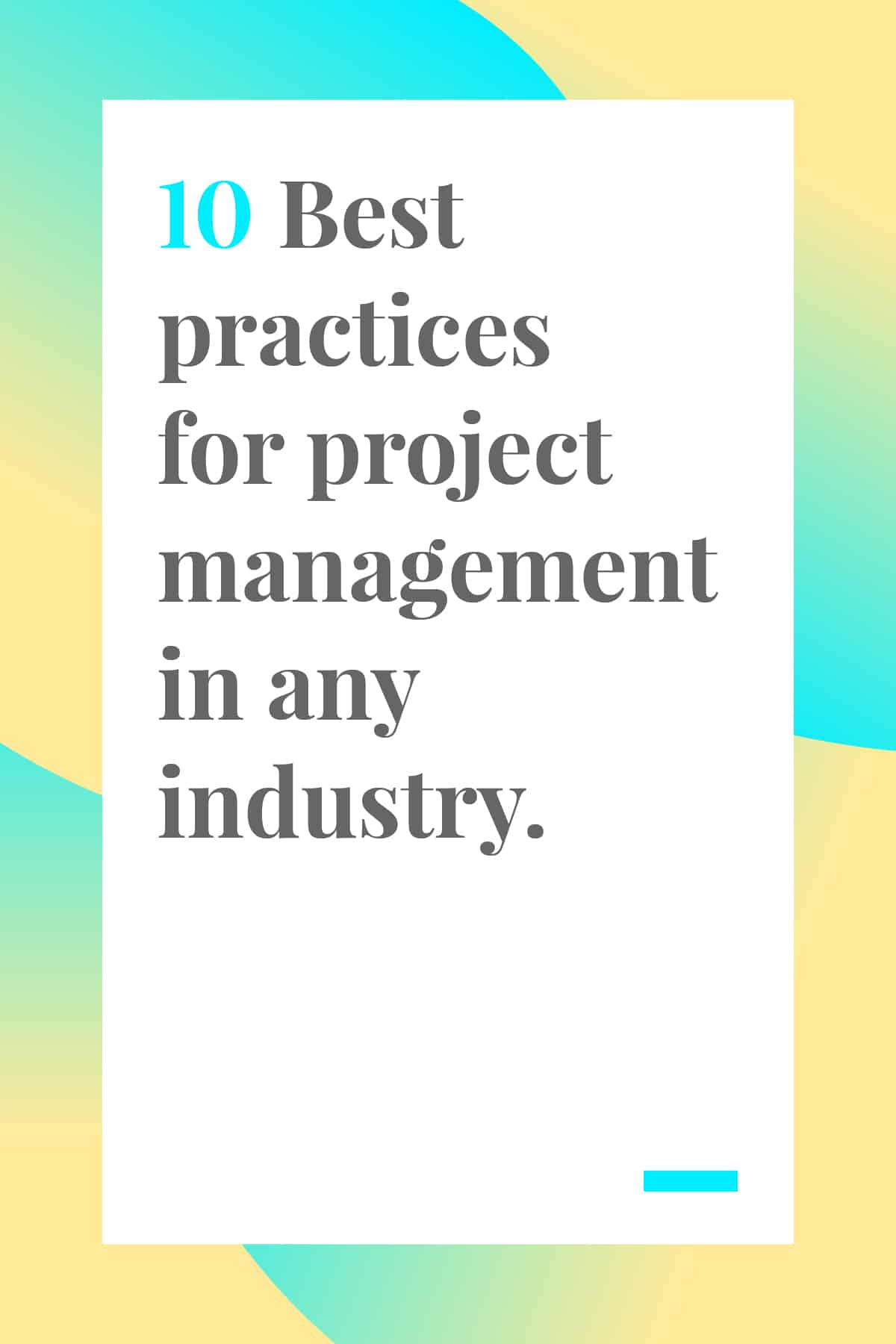They say practice makes perfect. I don’t know about perfect, but practicing definitely makes you better. Everyone has their own secret formula when it comes to project management. However, there are some key elements that, if practiced, can really set you apart from the rest. Here are the project management best practices that’ll get you started on the right foot.

Communicate with your team regularly
You may hear this a lot, but that’s only because it is such a valuable practice to master. Weekly scheduled meetings are great and all, but your communication efforts should push past that. You should be checking in with all of your team members every single day. Ask them about their needs and concerns, their ideas, or even their weekend plans. Sparking a conversation could result in a massive moral boost, and really get the ball rolling on the project.
On the professional side of things, checking in frequently means that questions can be answered quick and problems can be resolved. In order to accomplish this, you should have multiple channels of communication open.
Delegate Accordingly
If you’re a dedicated, hard worker, then delegation probably isn’t a word that you like very much. Delegating, for some, can be hard to get used to. Don’t be afraid to delegate if your plate is just a little full. It’s important to not only know when to delegate, but who to delegate to. Get to know your team inside and out. Learn who is best at certain tasks and assign them accordingly.
One of the best ways to delegate without relinquishing too much control is to use a shared tool to manage your team. Toggl Plan is a great option because you see both the big picture and the granular details. You can see your projects and team members in the monthly or quarterly view, or manage them more tightly using the checklist feature to add sub-tasks for each task you assign to someone.
[bctt tweet=”Do you hold kick-off #meetings before each #project? ” username=”toggl plan”]
Set milestones
While we’re on the topic of moral boosts, setting milestones in a project can really help. Milestones are basically the light at the end of the tunnel. Long and difficult projects can be broken down into smaller sequences so they become more manageable. Setting these milestones lets you and your team visualize the end and promotes an efficient workspace.
At Toggl Plan, we set milestones for major feature releases and deadlines (anyone else have a GDPR deadline?). But we also mark team-building milestones, like a start date for a new employee, and “Go Loco” weeks, when teams work together on a new project that’s unrelated to their every day tasks. Milestones like these keep everyone excited and make the work feel fresh. .
Organize everything
Whether it’s your timeline or weekly meetings, organization is the key to avoiding chaos. It’s easy to get lost sometimes, especially when you’re working on multiple projects. Make sure you have not only a clean and clear workspace, but a timeline for each project as well. Make it easy for team members to see what’s going on. Staying organized keeps everyone on track because it means all the necessary documents and tools are easy to find and easy to understand. If you get organized before the project begins and stay organized throughout, everyone will have a little less stress riding on their shoulders.
Hold kick-off meetings
What happens if the foundation to a house is crooked? Then the whole house will be off. In the same way, you should make sure everything is level when starting a project. A kick-off meeting is the perfect way to accomplish that. Hold a meeting before every project so that you know everyone is on the same page and reading from the same book. Go over all the details and plans for the direction of the project so that everyone has a roadmap. Make it clear and precise so that nobody gets confused.
Keep track of everything
This is much different than organization. Keeping track of everything not only means resources, documents, and your budget, but your time as well. You’ll want to reference all of this information later! Your time is valuable, so tracking it and comparing it to different projects’ time can help you make better project estimates. Tracking and documenting means that you’ll never second guess the details of a previous project.
Create a detailed timeline
It’s not enough to simply put tasks on a Gantt chart and be done. You have to give your team the advantage! Create a detailed timeline by attaching resources, scheduling meetings, and using any information you think might be helpful. There’s never enough detail when working on a big project. Make your timeline clear and defined from the get-go, and things will fall into place a little easier later down the road.
Look for feedback
Ask your team if what you’re doing is helping them to do their best work. You may not realize it, but there are some things you could be doing better. There is always room for improvement, and that’s nothing to be ashamed of. Ask clear and specific questions, and you’ll be more likely to get clear and specific feedback. Leave your ego at the door so people feel comfortable sharing their feedback. And once you have feedback, don’t ignore it. Make the changes that will help your team work better.
Hold wrap-up meetings
Celebrating your success is a big part of project management and is a great highlight for our project management best practices. Holding a wrap-up meeting lets you review the project highlights and discuss what your team can improve the next time around. Most importantly, it’s sort of a party! You’ve made it through all of the ups and downs of the project and came out on top, as a team. Now that’s a reason to celebrate!
Practice, practice, practice
Your goal should be to always look for ways you can improve and using these project management best practices will surely help you do so. Practice them every chance you get. Project management is a learning experience, so don’t shy away from learning!

Like many other people, Zach McDaniel gained his knowledge of management and project management through research and necessity. He believes that the most interesting thing about project management, management, and productivity is that there are so many different strategies, so there’s always something new to learn and share.


